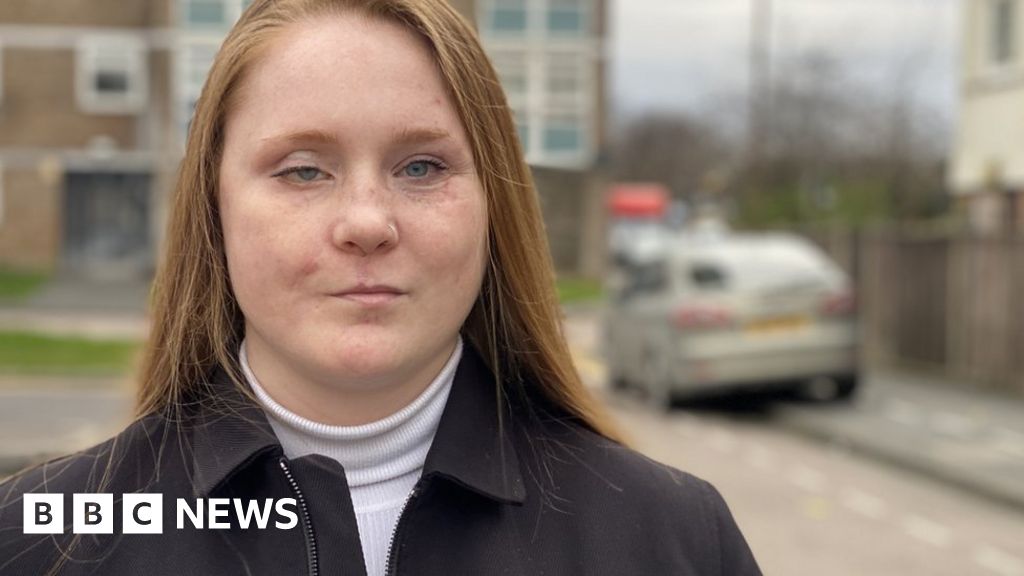- Written by Jim Reid
- health reporter
Shannon Brazier, 24, was in a coma for three weeks after being hit by an excavator at a construction site in east London.
For many people who have suffered a severe brain blow, physical recovery is only the first problem. Depression and other mental disorders are much more likely to develop after a head injury.
result of small US study This suggests that taking commonly used antidepressants in the weeks following an injury may actually prevent severe depression.
And a larger trial is now being carried out across the UK to investigate whether these findings can be replicated in a wider group of patients.
“I lost my hearing”
“I was told I had been airlifted to the Royal London.” [Hospital] “Then I was in a coma for three weeks. They had to call my family to say goodbye,” Shannon says.
Shannon, 24, was struck in the side of the head by an excavator while working at a construction site in east London in 2020. She needed surgery to reconstruct part of her face using muscles in her legs. Pins and wires hold her jaw in place.
But like many people who experience traumatic brain injury, the visible physical damage to her body was only part of the problem.
“It really affected my mental health and made me feel very depressed,” Shannon says. “I didn’t go out, I didn’t take care of myself, and I gained weight.
“Just getting out of bed and washing my face was hard. It was so hard that it was almost unbearable at times.”
In the immediate aftermath of such an accident, the focus tends to be on surgery, rehabilitation, and treatment of physical symptoms. However, long-term effects such as depression and mood swings can be severe for many people.
Shannon says it took “probably a year” after leaving the hospital before she started “coming out” with the right support and medication.
image source, Shannon Brazier
CT scan of Shannon’s skull
Research shows that about half of people were hospitalized after a head injury Report major depression In the year after the accident, the rate was 10 times that of the general population.
18 month trial in UK Investigating the early use of common antidepressants after brain trauma. The study will measure depression, quality of life, and cognitive function in 500 patients, with results expected in 2027.
“Most of the research to date has been about treating depression once it has started, which we know is difficult,” said lead researcher Professor of Psychiatry and Medicine at King’s College London. Khalida Ismail says:
“This is the world’s first large-scale study to actually try to stop it from happening in the first place.”
The trial is being carried out at nine major trauma centers in the UK and is being funded by a £2.2 million grant from the National Institute for Health and Care Excellence.
anxiety, mood, and memory problems
After a catastrophic experience, some level of psychological trauma and stress can be expected, with knock-on effects on employment, education, and relationships.
But doctors believe that a hard blow to the head can also disrupt the brain’s neural pathways that control memory, thinking ability, and emotion.
Sean Carty, 47, said he felt like he had “landed on a new planet” after experiencing severe head trauma and depression.
Five years ago, he was hit from a motorbike on a London two-wheeler road and was hospitalized for three weeks with a hemorrhage in the frontal lobe of his brain.
Sean Carty volunteers with the charity Headway East London, supporting people with traumatic brain injury.
“After I was discharged from the hospital, I tried to go back to work like before, but it was really difficult,” Sean says. He realized that his mind worked differently. His sense of smell and taste had changed and he had difficulty following his friends’ conversations.
Like many others, his actions also had consequences. He had a short temper and argued with his family more than he had before the accident.
“You don’t realize how outspoken you can be when you have a brain injury,” Sean says. “But it’s hard when your nervous system isn’t working properly. You feel like an alien and everything is new to you.”
Dr Mike Dilley, a consultant neuropsychiatrist at King’s College Hospital, says patients who see him with brain injuries are “much more concerned about anxiety, mood and memory issues than they are about physical problems. They may already be used to it.”
Professor Khalida Ismail from King’s College London is the lead investigator on the trial, which spans nine trauma centers in the UK.
It’s unclear exactly how selective serotonin reuptake inhibitors (SSRIs), the antidepressants being tested, work.
There is also a theory, although this is far from proven, that SSRIs may trigger an anti-inflammatory response and protect patients from long-term harm.
Doctors say tackling the broader issue could benefit the NHS and wider economy, with the estimated cost of brain damage Over £15bn each year.
“Depression is not just something that is in the mind,” Professor Ismail says. “It can affect relationships, work, education, and rehabilitation. And these are all consequences after a traumatic brain injury.”

